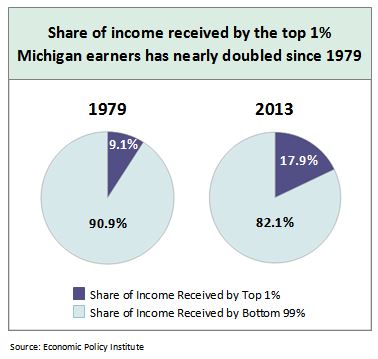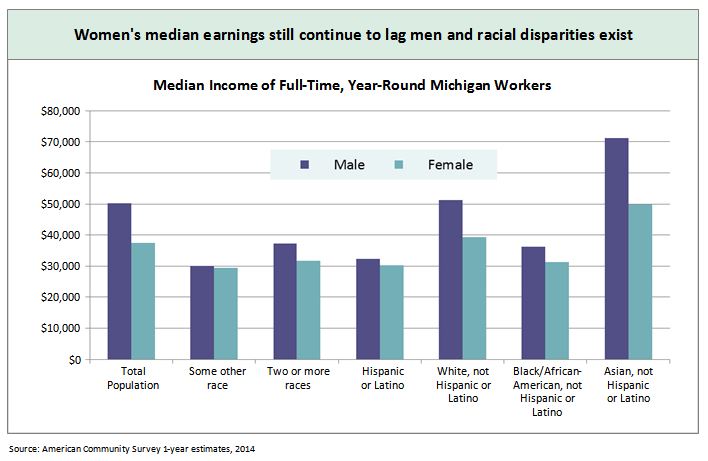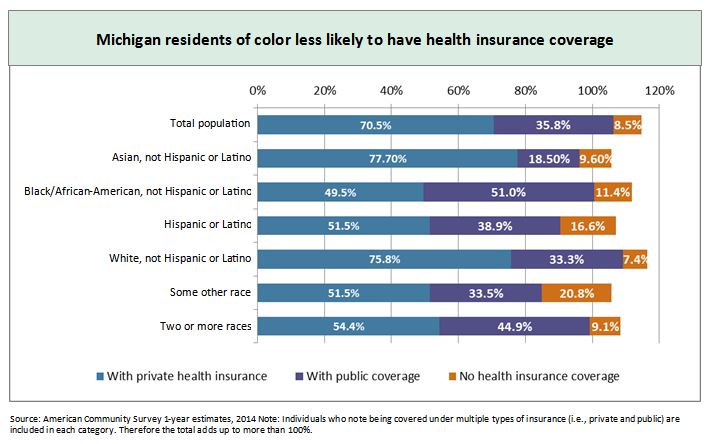 Michigan’s income inequality is a persistent and increasing problem that has a negative impact on the state’s residents and economy.1 Between 1947 and 1979, incomes at all levels increased at relatively similar rates for Michigan residents as well as nationally. In the late 1970s, there was a significant divergence as most of the income growth started going to the top earners and leaving the rest of Michigan residents behind.
Michigan’s income inequality is a persistent and increasing problem that has a negative impact on the state’s residents and economy.1 Between 1947 and 1979, incomes at all levels increased at relatively similar rates for Michigan residents as well as nationally. In the late 1970s, there was a significant divergence as most of the income growth started going to the top earners and leaving the rest of Michigan residents behind.
 Over the next 30-plus years, Michigan incomes fared worse than most of the rest of the nation. Between 1979 and 2013, overall incomes actually fell in the state. However, income decline in the bottom 99% solely caused this decline. In 1979, the top 1% of Michigan households held about 9% of the total income in the state. By 2013, the share of state income taken home by this group had nearly doubled to 17.9%, while the rest of Michigan residents saw their incomes decline.
Over the next 30-plus years, Michigan incomes fared worse than most of the rest of the nation. Between 1979 and 2013, overall incomes actually fell in the state. However, income decline in the bottom 99% solely caused this decline. In 1979, the top 1% of Michigan households held about 9% of the total income in the state. By 2013, the share of state income taken home by this group had nearly doubled to 17.9%, while the rest of Michigan residents saw their incomes decline.
Major income disparities exist between different genders and races. In 2014, Michigan women working full time still made only 74.6 cents for every $1 a full-time working male made. This is below the national average and ranks Michigan as one of the worst states in the Midwest region, trailing all of our immediate neighbors. In addition, women of color, and most men of color, continue to have lower median incomes than white, full-time working men.
 WHY DOES THIS MATTER?
WHY DOES THIS MATTER?
Simply put, poverty in Michigan—especially for children—is still too high, and our state’s economic recovery is leaving too many people behind. Many workers have full-time jobs, but are still barely getting by as they struggle to provide for their families. At the same time, Michigan continues to favor policies that benefit the wealthy, such as its regressive tax structure, while reducing, capping and eliminating programs that help the most vulnerable.
Unfortunately, income inequalities do not simply affect what ends up in your bank account. According to the national Economic Policy Institute, increasing inequality might lead to lower income mobility in future generations. Lower-wage earners are less likely to have access to employer-sponsored health insurance coverage and paid sick and family leave, and are more likely to have underfunded retirement accounts. Income gaps affect the ability to pay for healthcare or save for retirement or a child’s college education, and reducing these gaps will have a positive impact on Michigan’s residents, communities and economy.

WHAT CAN POLICYMAKERS DO TO REDUCE INCOME INEQUALITY?
Although income disparities at all levels continue at the national level, Michigan can implement state policies that can help bridge the divide:
- Improve working conditions: Michigan’s minimum wage is improving, and will rise to $9.25 per hour by 2018. However, more can be done to help Michigan’s lowest-paid workers, such as further raising the minimum wage or eliminating the tipped wage to narrow the gap. Expanding access to high-quality child care would allow more low-wage earners the ability to find more secure and higher-paid employment. Finally, enacting earned paid leave policies would provide workers the necessary flexibility to care for themselves or family members without risking losing money or even their jobs.
- Improve tax implications: Currently, Michigan’s lowest-income earners pay a higher rate in total state and local taxes than Michigan’s top earners; in fact, they pay nearly double the rate of the top 1%. Restoring Michigan’s Earned Income Tax Credit (EITC) to 20% of the federal credit, expanding the Homestead Property Tax Credit or implementing a fairer income tax, such as a graduated income tax, would let Michigan’s lowest-paid workers keep more of their hard-earned wages.
- Improve job opportunities: As our economy expands, more jobs will require at least some college education, if not a certification, associate degree or bachelor’s degree. Improving K-12 education—especially for children at risk of educational failure, increasing adult education and expanding access to post-secondary education would help retool Michigan’s workers for its new economy.
For almost four decades, Michigan’s income gap has been widening and it’s time to change that. State lawmakers must do more to adopt policies that will strengthen our economy, alleviate poverty and reduce income inequality for Michigan workers.

- Estelle Sommeiller, Mark Price, and Ellis Wazeter. Economic Policy Institute. Income inequality in the U.S. by state, metropolitan area, and county. Economic Analysis Research Network (EARN) Report. June 16, 2016. American Community Survey 1-year estimates, 2014. PolicyLink/PERE, National Equity Atlas, www.nationalequityatlas.org.
[types field=’download-link’ target=’_blank’][/types]




 Emily Jorgensen joined the Michigan League for Public Policy in July 2019. She deeply cares about the well-being of individuals and families and has a great love for Michigan. She is grateful that her position at the League enables her to combine these passions and work to help promote policies that will lead to better opportunities and security for all Michiganders.
Emily Jorgensen joined the Michigan League for Public Policy in July 2019. She deeply cares about the well-being of individuals and families and has a great love for Michigan. She is grateful that her position at the League enables her to combine these passions and work to help promote policies that will lead to better opportunities and security for all Michiganders. Jacob Kaplan
Jacob Kaplan 


 Mikell Frey is a communications professional with a passion for using the art of storytelling to positively impact lives. She strongly believes that positive social change can be inspired by the sharing of data-driven information coupled with the unique perspectives of people from all walks of life across Michigan, especially those who have faced extraordinary barriers.
Mikell Frey is a communications professional with a passion for using the art of storytelling to positively impact lives. She strongly believes that positive social change can be inspired by the sharing of data-driven information coupled with the unique perspectives of people from all walks of life across Michigan, especially those who have faced extraordinary barriers.  Rachel Richards rejoined the League in December 2020 as the Fiscal Policy Director working on state budget and tax policies. Prior to returning to the League, she served as the Director of Legislative Affairs for the Michigan Department of Treasury, the tax policy analyst and Legislative Director for the Michigan League for Public Policy, and a policy analyst and the Appropriations Coordinator for the Democratic Caucus of the Michigan House of Representatives. She brings with her over a decade of experience in policies focused on economic opportunity, including workforce issues, tax, and state budget.
Rachel Richards rejoined the League in December 2020 as the Fiscal Policy Director working on state budget and tax policies. Prior to returning to the League, she served as the Director of Legislative Affairs for the Michigan Department of Treasury, the tax policy analyst and Legislative Director for the Michigan League for Public Policy, and a policy analyst and the Appropriations Coordinator for the Democratic Caucus of the Michigan House of Representatives. She brings with her over a decade of experience in policies focused on economic opportunity, including workforce issues, tax, and state budget. Donald Stuckey
Donald Stuckey  Patrick Schaefer
Patrick Schaefer Alexandra Stamm
Alexandra Stamm  Amari Fuller
Amari Fuller

 Renell Weathers, Michigan League for Public Policy (MLPP) Community Engagement Consultant. As community engagement consultant, Renell works with organizations throughout the state in connecting the impact of budget and tax policies to their communities. She is motivated by the belief that all children and adults deserve the opportunity to achieve their dreams regardless of race, ethnicity, religion or economic class.
Renell Weathers, Michigan League for Public Policy (MLPP) Community Engagement Consultant. As community engagement consultant, Renell works with organizations throughout the state in connecting the impact of budget and tax policies to their communities. She is motivated by the belief that all children and adults deserve the opportunity to achieve their dreams regardless of race, ethnicity, religion or economic class.
 Megan Farnsworth joined the League’s staff in December 2022 as Executive Assistant. Megan is driven by work that is personally fulfilling, and feels honored to help support the work of an organization that pushes for more robust programming and opportunities for the residents of our state. She’s excited and motivated to gain overarching knowledge of the policies and agendas that the League supports.
Megan Farnsworth joined the League’s staff in December 2022 as Executive Assistant. Megan is driven by work that is personally fulfilling, and feels honored to help support the work of an organization that pushes for more robust programming and opportunities for the residents of our state. She’s excited and motivated to gain overarching knowledge of the policies and agendas that the League supports.

 Yona Isaacs (she/hers) is an Early Childhood Data Analyst for the Kids Count project. After earning her Bachelor of Science in Biopsychology, Cognition, and Neuroscience at the University of Michigan, she began her career as a research coordinator in pediatric psychiatry using data to understand the impacts of brain activity and genetics on children’s behavior and mental health symptoms. This work prompted an interest in exploring social determinants of health and the role of policy in promoting equitable opportunities for all children, families, and communities. She returned to the University of Michigan to complete her Masters in Social Work focused on Social Policy and Evaluation, during which she interned with the ACLU of Michigan’s policy and legislative team and assisted local nonprofit organizations in creating data and evaluation metrics. She currently serves as a coordinator for the Michigan Center for Youth Justice on a project aiming to increase placement options and enhance cultural competency within the juvenile justice system for LGBTQIA+ youth. Yona is eager to put her data skills to work at the League in support of data-driven policies that advocate for equitable access to healthcare, education, economic security, and opportunity for 0-5 year old children. In her free time, she enjoys tackling DIY house projects and trying new outdoor activities with her dog.
Yona Isaacs (she/hers) is an Early Childhood Data Analyst for the Kids Count project. After earning her Bachelor of Science in Biopsychology, Cognition, and Neuroscience at the University of Michigan, she began her career as a research coordinator in pediatric psychiatry using data to understand the impacts of brain activity and genetics on children’s behavior and mental health symptoms. This work prompted an interest in exploring social determinants of health and the role of policy in promoting equitable opportunities for all children, families, and communities. She returned to the University of Michigan to complete her Masters in Social Work focused on Social Policy and Evaluation, during which she interned with the ACLU of Michigan’s policy and legislative team and assisted local nonprofit organizations in creating data and evaluation metrics. She currently serves as a coordinator for the Michigan Center for Youth Justice on a project aiming to increase placement options and enhance cultural competency within the juvenile justice system for LGBTQIA+ youth. Yona is eager to put her data skills to work at the League in support of data-driven policies that advocate for equitable access to healthcare, education, economic security, and opportunity for 0-5 year old children. In her free time, she enjoys tackling DIY house projects and trying new outdoor activities with her dog.

 Amber Bellazaire joined the Michigan League for Public Policy as a policy analyst in June of 2019. Her work primarily focuses on state policy and budgets affecting Michigan’s Medicaid programs. Previously, Amber worked at the National Conference of State Legislatures tracking legislation and research related to injury and violence prevention, adolescent health, and maternal and child health. She also brings with her two years of Americorps service. As a full time volunteer, Amber had the opportunity to tutor high school students in Chelsea, Massachusetts and address issues of healthcare access and food insecurity through in-person outreach in Seattle, Washington.
Amber Bellazaire joined the Michigan League for Public Policy as a policy analyst in June of 2019. Her work primarily focuses on state policy and budgets affecting Michigan’s Medicaid programs. Previously, Amber worked at the National Conference of State Legislatures tracking legislation and research related to injury and violence prevention, adolescent health, and maternal and child health. She also brings with her two years of Americorps service. As a full time volunteer, Amber had the opportunity to tutor high school students in Chelsea, Massachusetts and address issues of healthcare access and food insecurity through in-person outreach in Seattle, Washington.
 Simon Marshall-Shah joined the Michigan League for Public Policy as a State Policy Fellow in August 2019. His work focuses on state policy as it relates to the budget, immigration, health care and other League policy priorities. Before joining the League, he worked in Washington, D.C. at the Association for Community Affiliated Plans (ACAP), providing federal policy and advocacy support to nonprofit, Medicaid health plans (Safety Net Health Plans) related to the ACA Marketplaces as well as Quality & Operations.
Simon Marshall-Shah joined the Michigan League for Public Policy as a State Policy Fellow in August 2019. His work focuses on state policy as it relates to the budget, immigration, health care and other League policy priorities. Before joining the League, he worked in Washington, D.C. at the Association for Community Affiliated Plans (ACAP), providing federal policy and advocacy support to nonprofit, Medicaid health plans (Safety Net Health Plans) related to the ACA Marketplaces as well as Quality & Operations.




